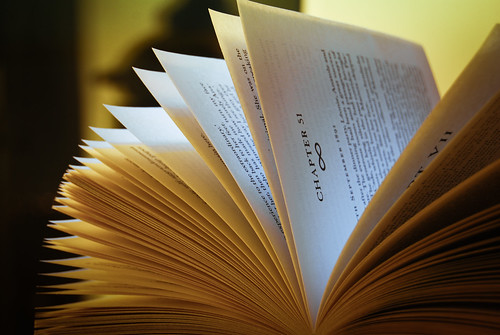
Image Light Reading by Martin from https://www.flickr.com
under license https://creativecommons.org/licenses/by/2.0/
https://www.edx.org/course/subject/literature This is the website link you need to click on if you want do some literature in English and you want to be guided in discovering plots, characters and in thinking about what you have learnt. It is an interesting activity online which is worth sharing as it can provide us with tools for working with our students. Every activity is in English and it is a good way for working online and learning.
The BerkleyX Club is organized by Maggie Sokolik and she runs the reading of a book which lasts four weeks. Every month she starts a new book and thousands of people from all over the world are reading the same book.
I started doing the activities online as I wanted to revise some old books which I had read when I was at university. It was December 2014. My first book was A Christmas Carol by Charles Dickens. I continued and did most of the readings, just for pleasure, in the next months.
Here is the list for the next readings, if you are interested you need to register to the platform: you are required to have an email and to choose the password for the access. If you want you can use also your FB account or Google+.
Some courses which are offered :
3rd February : A Room with a View
1st March: Call of the Wild
1st April : The Picture of Dorian Gray
1st June: Frankenstein
1st July: Dubliners
1st August : A Study in Scarlet
These are just a few books which you may have read. The tutor provides you with the e-book in pdf and a guided tour of the time and the writer in each week . Activities vary from sharing information online to posting reviews after you have done some online research. There is a discussion online where students can post their comments too.
Why is it good? Because you can use English and you can write and read in English.
For each week there is a test and a written assignment which can be based on an online research, describing a picture that is in relationship with the topic or issue presented in the book.
While I was searching the web I came across interesting videos and resources online. I am going to use the approach in class and some of the ideas which I have just seen in the activities I was asked to do.
For example the final activity for my task about Jane Eyre in January was to carry out some research online about the films which were made or to choose to write how I would write the script for a film based on Jane Eyre and which actors and actresses I would like to have in the film. My script changed a lot of things and I chose the love story between an English man named Rochester and a beautiful woman whose skin is not white. I wanted to underline the social class differences and the problems in the Victorian Age.
These are just some examples of how we could exploit literature in a different way:
- reading and commenting about characters and plots
- watching old films based on the films and comparing different films based on the books
- writing a review about what we have read or seen in a film
- commenting what others have written in a post
Testing was based on choosing the right items for questions related to each section we had done and which might refer to the themes, the characters, the mood, information about the writer and the story narrated.
If you are interested, just enrol online. I have already done many courses but I am willing to re-read what I learnt a long time ago.
The Reading Club might be interesting also for our students of Foreign Languages or in " Liceo Linguistico" who are interested in learning online.
All the activities are free and if you do most of them you can get a statement of accomplishment.